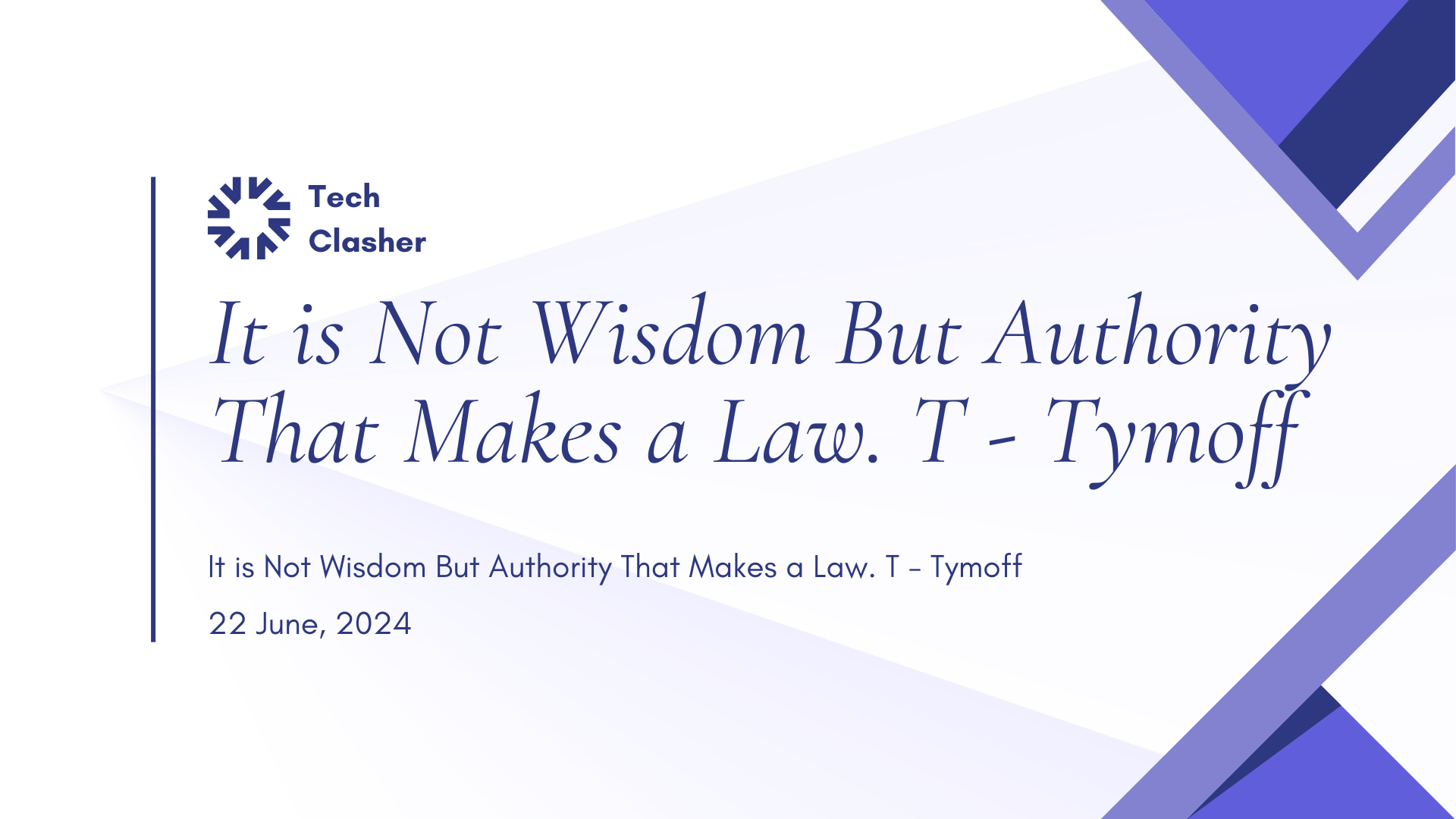In the complex interplay of law, authority, and wisdom, T. Tymoff is right when stating that “it is not wisdom but authority that makes a law,” because this statement reflects major characteristics of law as a phenomenon. This statement invites a deeper examination of the relationship between authority and wisdom in the creation and enforcement of laws. Here, we explore how authority, rather than wisdom, serves as the cornerstone of legal frameworks, influencing the formation, interpretation, and application of laws.
The Nature of Authority in Law
Power in relation to law making is the lawful right that a person or an organization has in making and implementing the laws and giving the interpretation of the same. This power is usually attributed to various apparatuses of the government including legislative, judicial, and executive branches in a given country. People utilize constitutions, statutes, public consent as sources through which legitimacy of authority is rewarded.
Historical Context of Legal Authority
Originally the power to create laws was vested for individuals in power like leaders of nations, monarchs or ruling councils. In today’s modern democratic societies, such authority is vested in the hands of the elected leadership and judicial systems. Despite the shift in how authority is structured, the central principle remains that authority, not wisdom, is the driving force behind the establishment of laws.
Authority vs. Wisdom: A Delicate Balance
While wisdom can inform and guide the decision-making process, it is ultimately the authority that codifies these decisions into binding laws. Wisdom might inspire just and equitable laws, but without the backing of authority, these laws cannot be implemented or enforced. Thus, authority acts as the vessel through which societal norms and ethical considerations are transformed into concrete legal standards.
The Role of Authority in Legal Systems
In this sense authority has discretionary powers as far as the legal governance of all forms of processes but also encompasses the making of laws, operation of laws, and sometimes even the interpretation of the laws. All of those functions are important in the sphere of the regulation of relationships between people and the preservation of justice.
Creation of Laws
Based on the democratic powers which stem from an election or the constitutional provision, legislative bodies have this central role of passing bills that would satisfy the desire of the people. Such activities are the deliberation, the debate and the voting which clearly classify as procedural activities based on authority. Although these processes may be thought out and logical, even if they are grounded in rationality as well as wisdom and knowledge, it is the legislative power that enacts legislation.
Enforcement of Laws
Police forces and other official regulatory agencies are some of the authorities who exercise the overbearing authority towards ensuring compliance with the provisions of the law. The power puts them in a position where they are able to probe individuals who violate legal requirements, apprehend them, and take the appropriate legal action. Basically, the enforcement power is crucial as a practical tool for implementation of laws and regulation and maintaining law and order.
Interpretation of Laws
Legal systems are another subset in which judicial systems shall determine and enforce laws mostly in definite conditions, and provide for conclusive actions. The judiciary reveals an important role in handling the actual adversarial conflict, as well as in the regulation and prevention of unfairness throughout the procedure and the execution of legal rules. The legal jurisdiction creates the possibility of defining interpretational laws or the way through which they can be interpreted in which the core, the law itself, highlights the notion of understanding a difference between authority and wisdom as a former defines the legal actions.
The Interdependence of Authority and Legitimacy
Power legal constraints must be a sum total of electoral mandates, legal structures, and societal tolerance levels. Unfortunately, the democratization of legal legitimacy is pivotal to the operation of the law.
Democratic Legitimacy
In democratic systems, the power to pass laws is vested in the people through an electoral process. The parliamentarians have a sovereign right to house make laws for the people who elected them in an endeavor to make the laws reflect the people’s wishes. This democratic legitimacy serves as the foundation for the authority of lawmakers and helps to promote citizens’ compliance with laws.
Traditional Legitimacy
One way in which legal systems start gaining their legitimacy is by borrowing from the past and/or cultural beliefs that support the system in place. It is this reliance on tradition or the common law that serves as a prop to the modern legal traditions as it endows current legal structures with an outlasted endorsement sustained by past judicial precedents.
Public Acceptance
The final arbitration of all legal questions in the last analysis is the public acceptance of authority’s decision. Popular acceptability of the laws to the people is crucial since people will listen and follow only laws that they feel are lawful and fair. Autonomous power may not work as planned or even face the perception of the community, and this underlines the importance of utilizing laws to cater for values and norms within the society.
The Practical Implications of Authority in Law
The primacy of authority in law has significant practical implications for governance and social order. Understanding these implications helps to appreciate why authority is indispensable in legal systems.
Ensuring Compliance
Authority is essential for ensuring compliance with laws. Without authoritative enforcement, laws would be mere suggestions, lacking the power to compel behavior or resolve conflicts. Authority provides the necessary force to uphold legal standards and protect public interest.
Maintaining Social Order
A well-functioning legal system relies on authority to maintain social order. Rules set up through autocratic procedures help assigning a legal framework which ensures that people and companies can act based on the expectancies they have. Thus authority guarantees noncompliance penalties and evenly distributes justice, which assures the society confidence in the legal systems.
Facilitating Governance
Inability to make policies is a major hurdle to governance, and thus authorities help in making and executing policies. Legal precedent gives government organizations the scales and the hammer to step in and control various aspects of society, from sickness and disease, to the threat of terror. These decisions reflect a decisive leadership vital for the efficiency of governance and the society at large.
Conclusion
T. Tymoff’s statement that “it is not wisdom but authority that makes a law” reflects one of the crucial concepts that define legal systems. While it can be submitted that wisdom can play an important role in the formation of certain laws, it has to be realized that it is authority that brings the force of law. Power is one of the key premises of legal systems in the process of creating, delivering, and applying the legislation, which regulates societal relationships. They help to comprehend the place of authority in legislation and, therefore, their essential function in creating the society in which people exist.

